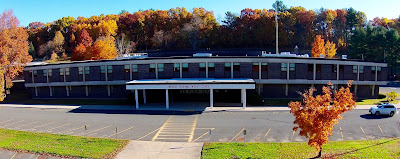'Twas a story that played out over too many months, too many Regional School Committee executive sessions and a final payout of way too many tax dollars -- $309,000 -- before it came to an ignominious end.
The precipitous fall of School Superintendent Maria Geryk, the highest paid town employee, is a cautionary tale that serves to remind us of the old maxim about absolute power corrupting absolutely.

Mike Morris, Maria Geryk, Amherst School Committee at Town Meeting May, 2016
Sure, there were grumblings over her entire tenure about failed academic programs, a seemingly revolving door for school principals, the high average cost per student driving our taxes skyhigh and the steady stream of students choosing charter schools over our hometown offerings.
But over the course of five years nothing seriously challenged her throne until Ms. Geryk made one fatal monumental error in judgment: issuing a "stay away order" to a single mother simply trying to get the public school system do something about the somewhat racially charged bullying of her 7-year-old daughter.
A story I first broke on April 14th and published over a dozen follow ups over the next four months.
But that first story was my highest read (20,000+) and most commented story (210) of the year and it set off a slow rumble leading to a major earthquake whose aftershocks will be felt for a very long time.
For instance the failure of the $67 million Mega School can be directly attributed to Maria Geryk's insistence on having it her way even though the vast majority of parents and teachers preferred a different academic model to solving the physical problems with Wildwood and Fort River Elementary schools.
And after almost four years of deliberations the attempt to e-x-p-a--n-d regionalization from the current 7-12 system all the way down to K-6 went front burner to back burner to dead & buried as well as the idea of merging the Regional Middle School students into the Regional High School thus freeing up that building for other productive uses.
Now the schools are searching for a another Superintendent and a couple of Principals. And of course I will get the blame for bringing down Maria Geryk and creating a "toxic" atmosphere that no sane bureaucrat will wish to endure even for the overly generous salary the position guarantees.

Eric Nakajima was appointed to Amherst School Committee by Select Board and School Committee vote
But the recent appointment of Eric Nakajima to the Amherst School Committee and his quick election as Chair of the Regional School Committee to replace Laura Kent, a rookie who couldn't handle the pressure, offers the best hope we've seen in a l-o-n-g while.
2017 promises to be an interesting year -- hopefully not in the Chinese curse sort of way.



































































